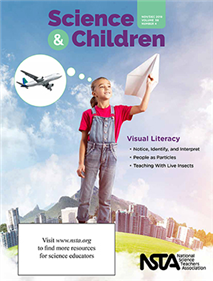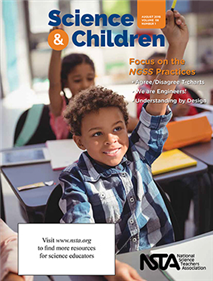All Crosscutting Concepts resources
Blog Post
I first encountered the KLEWS teaching strategy in an article in Science and Children (NSTA 2015), “KLEWS to Explanation-Building in Science.” I shared the article and modeled the strategy with teachers who wanted to support their K–5 students ...
Blog Post
Contemporary Instructional Approaches to Promote STEM Learning for English Learners
The release of the report English Learners in STEM Subjects: Transforming Classrooms, Schools, and Lives (shortened to “the report” hereafter) (NASEM 2018) is timely, as three emerging forces shape the changing landscape of K–12 science educati...
By Okhee Lee
Blog Post
Science Class: A Place Where Children Should Be Seen and Heard
I recently observed a lesson about how shadows change throughout the day, and I was fascinated by the amount of time the teacher and the class took to listen to and watch one another as they discussed the data. The careful structuring of time for ana...
By Cindy Workosky
Journal Article
The Early Years: Analyzing Media Representations of Animals
This column discusses resources and science topics related to students in grades preK to 2. This issue aims to engage children in analyzing and interpreting illustrations to determine sizes of pictured animals and give evidence for how they know. To ...
Blog Post
Shoes! Beaks! They’re All About Structure and Function
As we watch students arrive for class, we notice that Alejandra hangs her jacket on a coat hook, while Calder reaches for scissors to make a fringe on his picture. Tessa replaces her rain boots with the sneakers from her cubby, and Nick searches for ...
By Cindy Workosky
Blog Post
Exploring Structure and Function in Insects
As an entomologist, one of my greatest challenges is trying to overcome my students’ feelings of fear and disgust regarding insects. Insects often have negative images in society. Walk through any toy store, and you will likely find plastic insects...
By Cindy Workosky
Blog Post
Using Toxic Algal Blooms to Teach Structure and Function
Young children often experience a developmental stage in which they question everything. Why aren’t there dinosaurs anymore? Why do cats purr? Why are some potato chips green? They go from simply observing their surroundings to analyzing, experimen...
By Rebecca Brewer
NSTA Press Book
Reading Nature: Engaging Biology Students With Evidence From the Living World
By making room for this book in your curriculum, you’ll have a fresh way to motivate your students to look at the living world and ask not only “Why?” but also “How do we know?” Unique in both its structure and approach, Reading Nature is a...
By Matthew Kloser, Sophia Grathwol
Blog Post
Modeling in Science Instruction
With the shift toward three-dimensional teaching and learning that the Next Generation Science Standards requires, the Crosscutting Concept of Modeling has become a major focus of my instruction. I use a process that involves revisiting the sam...
By Cindy Workosky
Journal Article
The Early Years: Making Sense of Their World
This column discusses resources and science topics related to students in grades preK to 2. In this issue students document the apparent movement of the Sun by making and recording two daily observations for a period of time and looking for a patter...
Blog Post
What Does 3-Dimensional Space Look Like
When transitioning my classroom instruction to three dimensional learning, I decided to start with one or two areas in each unit or lesson set where I felt the most need. I was already purposeful in selecting activities that I carefully sequenced to ...
By Korei Martin
Blog Post
Global Thinking Inside and Outside the Classroom
Dynamic Equilibrium. These two words represent what is essential in teaching Earth science: the idea that forces are constantly working against one another, but often do so in ways that nearly counteract one another....
By Cindy Workosky





